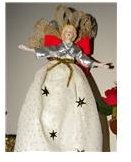German Language Education: Vocabulary and Expressions for Christmas Traditions
German Pre-Christmas Traditions
The festive season in Germany starts on the 4th of December, the date beginning the four weeks leading up to Christmas. To mark the season, people in Germany buy or make a wreath, richly decorated and with four candles, one of which is lighted each consecutive Sunday.
Adentskranz (m) = Advent wreath
Kerze (f) = candle
Tannengruen (n) = greens to decorate the wreath
Glimmer (d) = tinsel
Schleife (f) = bow
Adventskalender (m) = calendar marking the days of Advent
The Adventskalender is also a very typically German tradition. A calendar has 24 cut out windows, each of which is opened daily, beginning on the 1st of December. In slots behind each window children find sweets and other little treats. There are also Adventskalender for adults with small gifts or, at the top of the price range, even pieces of jewelry. Each day until Christmas, a door yields a gift.
Adventszeit (f) = Advent season
Vorfreude (f) = anticipation
Kerze anzuenden = to light the candle
Kerze ausblasen = to extinguish the candle
Weihnachten = Christmas
Weihnachtsmarkt
During Advent nearly every German city, town or village installs its particular Christmas market, often in the marketplace. A visit to the
Christmas market is an old German tradition and so are the merchandise, food and drink on sale.
Weihnachtsmarkt (m) = Christmas market
Rauschgoldengel (m) = Glitter angel
Christbaumkugel (f) = bauble to hang on Christmas tree
Baumspitze (f) = tip to put on top of Christmas tree
Lametta (n) = tinsel
Weihnachtsbaumschmuck (m) = Christmas ornaments
Krippe (f) = crip
Holzschnitzereien (f) = wood carved figures
Bockwurst (f) = hot sausage
Gluehwein (m) = mulled wine
Zuckerwatte (f) = candy
Gebrannte Mandeln (f) = roasted almonds
Kastanien (f) = chestnuts
Weihnachtskarussel (n) = Christmas Merry go round
Marktbesuch (m) = visit to Christmas market
Schnee (d) = snow
Frost (m) = cold
Kaelte (f) = cold
Warm anziehen - wrapping up warmly
Faeustlinge (f) = mitts
Familienbesuch (m) = family outing
rote Backen (f) = red cheeks
rote Nasen (f) = red noses
Christmas Eve
The most important day of the three Weihnachtsfeiertage in Germany is the 24th of December, Christmas Eve, as it’s then that gifts are exchanged. In the morning, the Christmas tree is decorated and gifts are placed under it. In the late afternoon a bell is rung, the doors are opened, the candles lit, carols sung and gifts opened.
Weihnachtsbaum (d) = Christmas tree
Tannenbaum (m) = Christmas tree
Weihnachtsbaum schmuecken = to decorate the Christmas tree
Weihnachtsfeiertage (f) = Christmas hoildays
Geschenke (f) = gifts
Geschenkpapier (n) = wrapping paper
Weihnachtskarte (f) = Christmas cards
schenken = to give
Gloeckchen (n) = little bell
Glocke laeuten = to ring the bell
Weihnachtslieder (f) = Christmas carols
Weihnachtsessen (n) = Christmas dinner
Weihnachtsgans (f) = Christmas goose
Weihnachtskarpfen (m) = Christmas carp
Bratapfel (m) = baked apple
Weihnachtspunsch = Christmas punch
Mitternachtsmesse (f) = midnight mass
Additional reading
For further German Pre-Christmas traditions go to my article about Christmas Preparations in Germany.
We hope you enjoy this visit to a German Christmas with Bright Hub Education!
References
- Image: Glitter Angel by sssh221 under Morguefile Free License
